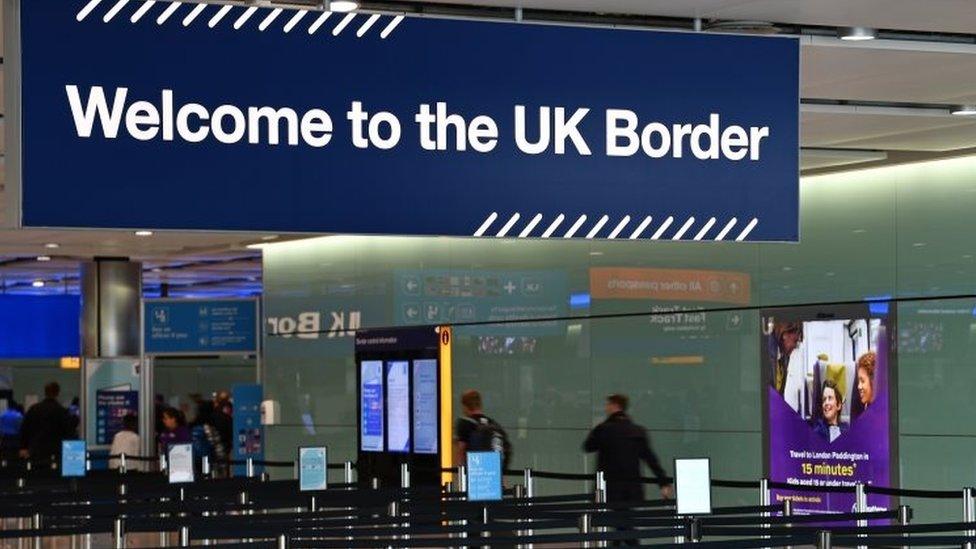General election 2019: So where do main parties stand on immigration?
- Published
Laura Kuenssberg's full interview with Labour leader Jeremy Corbyn focusing on Labour's immigration policy
Both the main parties have been snarled up today in their promises about immigration.
Higher? Lower? Limited? Unlimited? European, non-European? Skilled? Un-skilled?
Labour is tangled up over whether it will do what its conference voted to do in September, to "extend freedom of movement" if it wins the election.
Home Secretary Priti Patel was repeatedly pressed over whether the Conservative Party's intention is truly to cut the numbers overall, or just to have control.
A party press release said a Tory government would reduce the numbers, but in later interviews Ms Patel was less enthusiastic about repeating that language.
No mistake, Labour and the Tories have radically different approaches to handling the number of people that move to the UK.
'Family reunion'
This has been roughly stable for the past few years, with the country growing by roughly the equivalent of a city like Newcastle or Oldham being added to the population.
But the debate about it has been anything but stable, hence the political nerves.
Jeremy Corbyn's policy looks set to make it easier for people who live here to bring other members of their family into the UK, the process of "family reunion".
The previous government made it harder for that to happen by increasing the income level required for people who wanted to bring their relatives to live here.

It was clear talking to the Labour leader today that is something he would seek to reverse in office, and he would want to maintain the rights of Brits who have married EU citizens and their children to live here too.
He didn't want to be definitive about it today because, formally, Labour won't reach a position on the policy until their manifesto is officially set at the weekend, and there are tensions in the party about how far to go.
The added complication for Labour of course, is that well past the manifesto, they can't be definitive about their long term stance until its clear if we are actually going to stay in the EU.
'Points-based system'
That, in turn, won't be settled until after the referendum they would offer on Brexit if they win the keys to Number 10.
Wherever the policy lands, Jeremy Corbyn was obviously reluctant to tell us today if he believes, even as a matter of principle, that immigration should go up or down, even though there are plenty of people in his part of the party who strongly believe in open borders.
Even if he agrees, at this stage of an election it's certainly not something he would want to say openly because plenty of Labour voters would have genuine concerns.
In the other camp, there's no question that the Conservatives' approach is to bring immigration down over time.
Remember of course, that Boris Johnson's central message when he was Brexit's chief cheerleader in 2016 was to take control of the numbers, widely understood to mean a cut.
The Conservatives' plan is, first off, to end unlimited immigration from the EU because freedom of movement would end if and when Brexit happens.
And then, in time, but not before this election, to develop a system where people who want to come and live and work here would be based on the needs of the economy, that fabled "points-based system".
Toxic shadows
But at this stage, the Tories are nervous about seeming too hard-edged in pushing for drastic cuts, partly because they don't want to cut off skilled immigration, partly because they are recovering from a widely discredited arbitrary target set by Theresa May, and also because they say they want to take an approach that's based on what the economy needs.
Insiders tell me their focus groups are far less concerned about the numbers when it comes to immigration than they are about the idea of the UK being able to make its own decisions.
Labour and the Tories are both worried about the toxic shadows that the immigration debate can cast - in opposite ways.
Jeremy Corbyn is concerned about looking like he would fling the doors open.
The Tories fear looking like they would slam them shut.
The truth, as ever, for both of them, is far from as simple as that.
But that means at this stage, both of them are struggling a bit to communicate with total clarity about what they would do if they are lucky enough to win.
